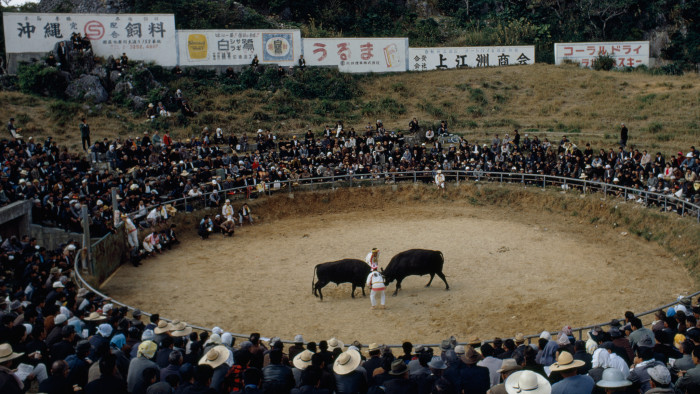‘Bullfight’, by Yasushi Inoue

Simply sign up to the Life & Arts myFT Digest -- delivered directly to your inbox.
Bullfight, by Yasushi Inoue, translated by Michael Emmerich, Pushkin Press, RRP£12/RRP$18, 128 pages
Yasushi Inoue has been called one of the best Japanese novelists you’ve never heard of. A prolific writer, he produced some 50 novels and nearly 200 novellas and short stories during a career that spanned four decades from the late 1940s until his death in 1991. He was sometimes mentioned as a possible Nobel Prize winner, but was never selected.
Much of his oeuvre comprises meticulously recreated historical fiction, but another strand of his work deals with the social and economic realities of postwar Japan. Bullfight, the story of a small-time newspaper editor’s bold, possibly foolhardy, plan to stage a bullfight in an Osaka baseball stadium, is one of those. Beautifully translated by Michael Emmerich, the 128-page novella is a disarmingly simple tale of ambition and entrepreneurial daring set against the background of a bombed-out country struggling to its feet.
In 1949, when Inoue wrote Bullfight, he was already 42, yet it was only his second work of fiction. It went on to win the prestigious Akutagawa Prize. Although Inoue himself describes the book as hovering between “beginner’s enthusiasm” and “youthful ungainliness”, the story is written in tight, confident prose. Like river water flowing over pebbles, the words reveal rather than obscure meaning, which flashes beneath the transparent surface.
The story takes place just a year after Japan’s surrender. The country is shattered but returning to some kind of normality. A college friend of Tsugami, the protagonist newspaper editor, has died at war but his “bones had not yet come home”. The public is still accustomed to “oafish wartime papers”, not the free-spirited publication Tsugami runs. Temple bells in Kyoto, long silenced by war, ring in the new year. Inoue’s prose contains more than meets the eye. One character is dressed in “elegant attire, from his impeccably white collar to the tips of his well-polished shoes, everything the best that could be had these days”. The words “these days” seem almost an afterthought, yet hint at daily deprivation.
It is against this background that Tsugami puts his newspaper’s finances at risk to sponsor a bullfight. The bulls, which fight each other rather than a matador, are to be brought from the island of Shikoku, where such contests have traditionally been held. Though the spectacle has no history in Osaka, Tsugami figures that people will bet on the outcome of bullfights. “In these postwar days, perhaps this was just the sort of thing the Japanese needed if they were going to keep struggling through their lives.”
Tsugami gambles everything on the success of the three-day tournament, including his relationship with his long-time mistress, Sakiko. He doesn’t figure on the wheeling-and-dealing that surrounds him as people try to get ahead. The black market is flourishing. A shipment of feed for the bulls is used as cover for transporting hard-to-obtain items such as sugar. Much of the success of the enterprise depends on whether it rains on the days of the tournament. Tsugami, though, is unwilling to hedge his bets. He refuses an offer from a businessman peddling Clean & Cool breath freshener to underwrite all the ticket sales for a 20 per cent cut. Though Inoue is never heavy-handed, the bullfight becomes a metaphor for Japan’s attempts to rebuild its economy.
There’s a certain grim humour throughout. Tsugami and his partner seal their decision to stage the bullfight with a meal in Kyoto. They elect to have sukiyaki, or grilled beef, since “we’re going to get fat off these cows!” To advertise the spectacle, they hire the services of a funeral parlour director, who uses part of his petrol ration to operate sound trucks loaded with comedians and dancing revue girls. By the time the event is staged, Tsugami has concluded that the fight itself is “a senseless competition between two animals” and that “which bull won and which lost was a matter of no concern”. His cynicism tolls with the mood of a country that doesn’t yet know whether it can escape the poverty of defeat.
Bullfight has long been available in German and French. Pushkin’s exquisitely produced edition provides readers of English with long-overdue access to an important Japanese voice. There are plans to publish more, including The Hunting Gun, also written in 1949, and considered one of Inoue’s best works. If Bullfight is any guide, what follows should be well worth the wait.
——————————————-
David Pilling is the FT’s Asia editor and author of ‘Bending Adversity: Japan and the Art of Survival’, to be published by Penguin in January
Comments